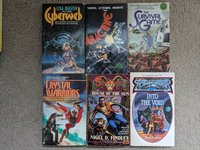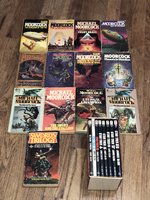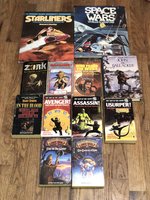I finished up Xenocide last week, and, well, I found it rather disappointing. While I thought Ender's Game and Speaker for the Dead were excellent, Xenocide, while having some strong passages, fell flat for me. To the point where I'm not in any rush to open Children of the Mind, even though Xenocide ended on a bit of a cliffhanger. I'd rather read something else first, to cleanse the palate, or perhaps just not bother at all, and pretend that Speaker was the end of the Ender Saga. Ha.
I don't know, it began interestingly enough, and I enjoyed the mysteries and culture of Path, prior to the big reveal about it with Congress anyway. Sadly, the Path storyline was abandoned for hundreds of pages going down the stretch, only for it to receive an unceremonious denouement in the final act. Seemingly, only as if to wrap up a loose end.
And Lusitania, for all of its strange otherness and wonder in Speaker, was treated far more linear and matter of factly in Xenocide. Ender's inherited family of scientists and their endless technobabble dominate the 600ish pages of the story. It reminded me of those TNG Trek stories where Data and Geordi spend an episode attempting to solve a problem with the warp core reactor, and the writers use a myriad of scientific buzzwords that make no sense, but sound good. The difference being, in an episode of Trek, those conversations have brevity and are interspersed with parallel stories and action throughout the duration. In contrast, Card spends an inordinate amount of time, page after page, focusing on conversations between the scientists regarding physics and botany, among other areas of science. And after a while, it became crystal clear that Card is not a scientist, and has had little education in these subjects in which his characters are having their endless technobabble conversations. Literally, hundreds of pages of this.
The lack of plausible, comprehensible science is fine in a sci-fi novel if that isn't the focus. And in Ender's Game and Speaker for the Dead, Card delved into grand ideas, morality and the very nature of what it means to be a sentient being, all set within the science fiction setting. In Xenocide, those ideas, while still there, fall to the background, and the science (or very loose psuedo-science I should say), becomes the sole focus. And this is very much to the story's detriment.
I'm kidding myself though, when I say that I won't read Children of the Mind, but I've got to say, that it's more out of obligation/completion sake than actual desire. And I've got tons of quibbles about characterization and any number of things that are flawed in Xenocide, but I've written enough at this point. Besides, I'd hate to further spoil the wonder for the uninitiated. Ha.





